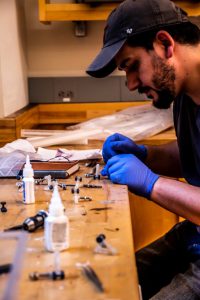 Materials Science and Nanotechnology (UNAM) PhD graduate Mehmet Kanık, currently pursuing postdoctoral studies at the Massachusetts Institute of Technology, has with MIT researchers developed artificial muscles that can stretch to remarkable lengths and lift more than 650 times their weight.
Materials Science and Nanotechnology (UNAM) PhD graduate Mehmet Kanık, currently pursuing postdoctoral studies at the Massachusetts Institute of Technology, has with MIT researchers developed artificial muscles that can stretch to remarkable lengths and lift more than 650 times their weight.
The research team’s study, “Strain-Programmable Fiber-Based Artificial Muscle,” was published in the July 12 issue of Science and highlighted on the journal’s cover.
“Our research shows that artificial muscles with a high weight-lifting capacity and fast response times can be produced at a scale of hundreds of meters with lateral dimensions ranging from microns to millimeters,” notes Dr. Kanık, explaining the significance of the study. “Fiber drawing enables manufacturing at an extremely high throughput and offers a straightforward means to tune dimensions. This means that our technology can be applied at a microscale, for example in microrobotic applications (such as surgical robots), or at a macroscale, for example in lightweight prosthetic limbs.”
Dr. Kanık began working on the development of fiber devices and new materials for fibers in 2008, while at Bilkent, and has continued that line of research at MIT. “Creating a functional fiber similar to the human muscle was always a dream,” he says. “I’ve been trying different strategies and using various materials for a long time. When I joined the team led by Prof. Anikeeve, who shares the same dream, she provided great motivation and a perfect working environment in which to create artificial muscles for biological applications.”
